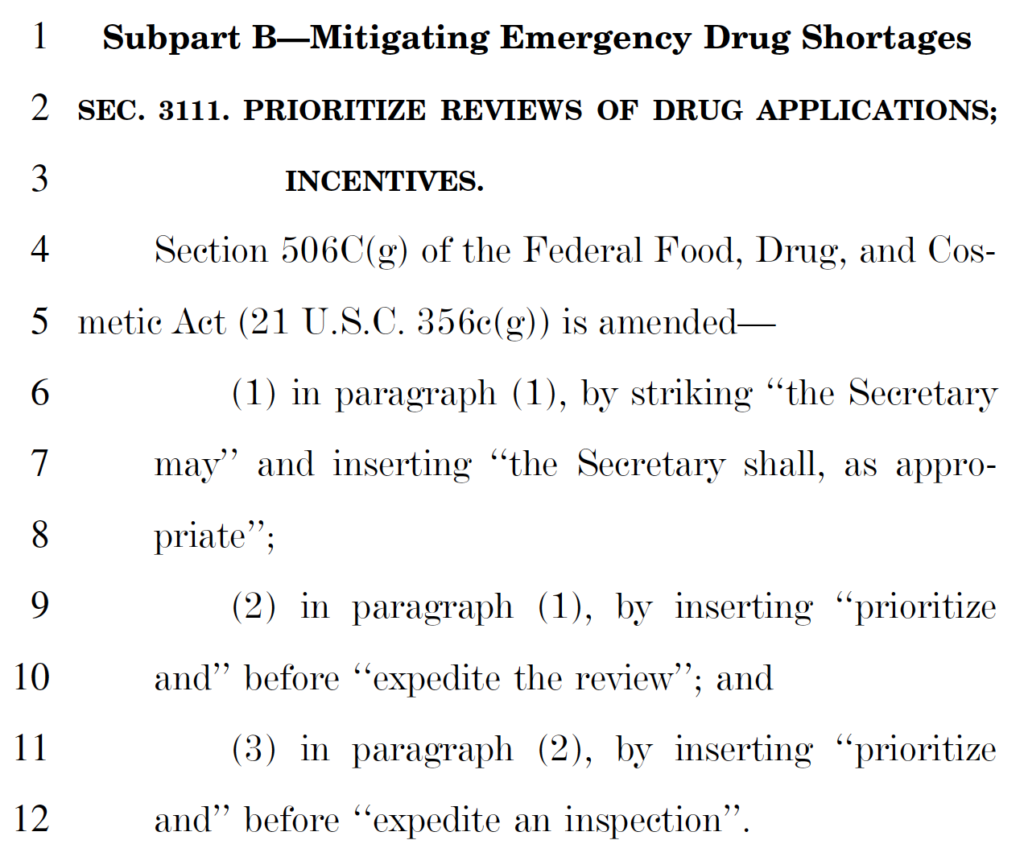Insight
March 25, 2020
Regulatory Provisions in the Phase 3 Stimulus Package – UPDATED
Executive Summary
- The Coronavirus Aid, Relief, and Economic Security (CARES) Act now focuses on two major Food and Drug Administration (FDA) deficiencies as the agency continues to address the COVID-19 emergency: the prioritization of drug approvals, and its apparent lack of knowledge about shortages of critical medical devices.
- The Act would codify a more assertive stance toward FDA’s emergency drug approval process and require medical-device and drug manufacturers to share more information on discontinuances and shortages of critical devices and drugs.
- While the reforms cannot directly address some of the failings in recent weeks, there is hope that they will help ameliorate ongoing issues as the health care sector continues to combat this disease.
Introduction
The Coronavirus Aid, Relief, and Economic Security (CARES) Act recently introduced in the Senate contains provisions that aim to address critical problems that exacerbated the spread of COVID-19. News reports have focused on the Food and Drug Administration’s (FDA) failure to cut red tape regarding laboratory-developed tests and a shortage of ventilators and other medical supplies that would be needed to properly test and care for possible COVID-19 patients. In light of increased testing approvals over recent days, however, the final bill’s focus in terms of regulatory process shifts to further expediting the approval of potential drugs to combat the disease.
Prioritizing Drug Reviews
As the focus in combatting the pandemic moves toward ascertaining correct treatment options, one brief section of the CARES Act readjusts the legal language concerning certain expedited drug reviews. The relevant section is as follows:
These changes may seem like slight language tweaks, but they subtly readjust the construction of Congress’s mandate to FDA on this matter. The current “may” simply grants FDA the discretion to undergo expeditious approvals; replacing that with “shall, as appropriate” signals the intent to direct the agency to automatically do so as long as the situation meets the underlying criteria. The inclusion of “prioritize and” in the other lines further instigates FDA action on this front. In short: The new law would remove FDA’s ability to consider such expedited reviews as simply an optional action.
Addressing Shortages
The second major issue is that the federal government was caught seemingly unaware of the shortage of critical medical equipment, including ventilators for patients, personal protective equipment for health care workers, and testing components – such as swabs and reagents – needed to meet testing demands.
The CARES Act would add a new requirement that manufacturers of medical devices share information on possible discontinuances or shortages with the Secretary of HHS. The requirement would apply to those devices and equipment deemed by HHS to be critical to a public health emergency, or that HHS determines would be critical in advance of an emergency. These notifications must be submitted to HHS at least six months in advance, or as soon as practicable. HHS will make this information available to the public except in instances where HHS believes doing so would cause the public to “over purchase” the product in question.
The CARES Act would also expand current requirements to notify HHS of possible drug shortages by adding a provision covering drugs that may be necessary in a declared public health emergency. The legislation will also require the Government Accountability Office to report on FDA’s “intra-agency coordination, communication, and decision-making” regarding device and drug shortages ahead of the current emergency, which may lead to more reforms in these areas in the years to come.
Conclusion
The CARES Act aims to correct regulatory policy challenges that impede medical professionals’ ability to care for patients during the COVID-19 emergency. The reforms cannot directly fix some of the errors made in recent weeks but may help prevent a repeat of similar mistakes, if only through lessons learned, in future public health emergencies.












